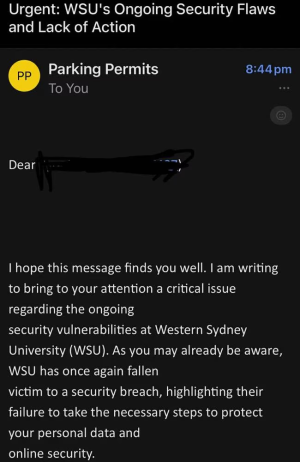
When Deanna opened her email that one morning, her world seemed to collapse in seconds. The message from Western Sydney University appeared official, complete with letterhead and legal jargon—but its contents were devastating. Her degree had been revoked, her decade of effort rendered meaningless.
For 20 minutes, Deanna believed her entire future had been erased.
‘For the 20 minutes or so I thought this might be real, my entire life was down the drain,’ she shared, describing the ‘deeply cruel email’ that left her panicked before she realised it was fake.
She was not the only one caught in the nightmare. Hundreds of Western Sydney University students and graduates received similar fraudulent messages, many claiming their qualifications had been cancelled and demanding they return their original certificates.
'For the 20 minutes or so I thought this might be real, my entire life was down the drain.'
A university under siege
The incident marked the latest chapter in what experts called one of Australia’s worst higher education cybersecurity crises—a two-year ordeal that exposed the personal details of thousands and cast doubt on the integrity of university qualifications.
Western Sydney University had already faced at least three major data breaches in 2024 alone, with cybercriminals maintaining access to internal systems for months.
The timeline revealed just how relentless the attacks had become
- May 2024: Hackers infiltrated the Microsoft Office 365 environment for nine months, affecting approximately 7,500 individuals.
- July 2024: The university’s Isilon storage platform was compromised, with unauthorised access lasting from July 2023 to March 2024 and exposing 580 terabytes of data.
- August 2024: The Student Management System and Data Warehouse were breached on 14 August, discovered nearly two weeks later.
- January–February 2025: Another breach through the single sign-on system impacted 10,000 people.
‘Western Sydney University has been the subject of persistent and targeted attacks on our network,’ admitted WSU Vice-Chancellor George Williams, as the institution battled to contain what appeared to be an ongoing digital siege.
What data was compromised
Names, addresses, and dates of birth
Student ID numbers and university email addresses
Tax file numbers and identity documents
Tuition fee information and HECS details
Academic records, including grades and progression data
Phone numbers and demographic information
The psychological toll of fake degree revocations
The latest wave of fraudulent emails took cruelty to new heights.
One message, designed to look like it came from an official ‘no-reply’ address, informed recipients that their degrees had been permanently revoked following a ‘thorough review’.
‘We regret to inform you that, following a thorough review, the decision has been made to permanently exclude you from any further study at Western Sydney University,’ the fake email read, citing internal legislation and policies to appear authentic.
It even advised students to ‘consult with a solicitor to understand your rights,’ adding a chilling layer of credibility.
A second fraudulent message, seemingly from ‘parking.permits’, outlined how the university’s security flaws were allegedly exploited.
It claimed hackers used simple web development tools and accused the university of ignoring vulnerabilities dating back to 2017.
When academic integrity comes under question
Perhaps the most alarming part of the hoax was its claim that student grades had been secretly altered.
The email alleged ‘verified instances where student grades were modified without the university’s knowledge’ and that WSU had ‘no idea how many students may have had their grades altered’.
While these claims were false, they struck at the core of the institution’s academic reputation—prompting fears that employers might question the legitimacy of WSU qualifications.
The university later confirmed that some of the stolen data had surfaced on dark web forums.
Although WSU issued takedown requests to remove information from open web platforms, experts warned that data on the dark web was nearly impossible to fully erase.
What graduates and families should know
If you or someone you know graduated from Western Sydney University, here’s what to do next.
Immediate steps
- Any emails claiming your degree has been revoked are fraudulent
- Contact the university directly if you receive suspicious correspondence
- Monitor your credit report for unusual activity
- Be cautious of phishing attempts using your personal information
Longer-term considerations
- Keep your qualification documents safe
- Request official verification letters if needed for employment
- Stay updated on the ongoing police investigation
The broader implications
WSU was not the only institution under threat.
Other universities, including the University of Sydney, had also been targeted by cybercriminals in recent months.
However, the repeated and sustained nature of attacks against WSU raised major concerns about how well Australian universities were prepared to protect student data.
Even though some of the fraudulent messages encouraged victims to report WSU to the Tertiary Education Quality and Standards Agency (TEQSA), those suggestions were part of the scam itself.
Still, they underscored a growing demand for independent oversight of how institutions handle cybersecurity failures.
Protecting yourself after a data breach
- Never click links in suspicious university emails
- Verify any concerning messages by calling the university directly
- Monitor financial accounts and credit reports regularly
- Report suspicious activity to NSW Police or the Australian Cyber Security Centre
- Keep copies of all official correspondence from the university
University’s response falls short
In response, the university introduced new security protocols—mandatory password resets, 24/7 monitoring, stronger firewalls, and an expanded cybersecurity team.
Despite these efforts, breaches continued, leaving many questioning whether the measures were enough.
‘The University sincerely apologises for the impact of these incidents on its community and remains committed to transparent communication and rectifying this matter as quickly as possible,’ it said in a statement.
For former students like Deanna, however, the damage had already been done.
For many, the crisis represented more than a technical failure—it was an attack on their hard-earned achievements and professional credibility.
And as investigations continue, the true cost of this cybersecurity disaster may not be known for years.
What This Means For You
Between 2023 and 2025, Western Sydney University became the target of several major cyberattacks that exposed the personal and academic information of thousands of students and staff.
The fallout was severe—fake emails circulated claiming degrees had been revoked, sending panic through the university community. Although the university implemented stronger cybersecurity measures, breaches continued to occur, eroding trust in its systems and response.
For anyone who once studied or worked at a university, this incident is a sobering reminder that our personal data can remain vulnerable long after graduation. It raises an important question: how well are the institutions we once trusted really protecting our information today?
While Western Sydney University continues to grapple with the fallout of repeated cyberattacks, the broader question remains—how can institutions and individuals protect themselves against the growing threat of online crime?
The government has already taken notice, moving to strengthen national cybersecurity frameworks and introduce tougher laws aimed at stopping these digital threats before they cause more harm.
If you’re interested in how these changes could help prevent future breaches like the one WSU faced, the following story breaks down the latest measures in detail.
Read more: Government introduces new laws to tackle growing cybercrime—here's how they plan to protect you
Cyber Incident | Western Sydney University — Details the May 2024 breach of WSU’s Microsoft Office 365 environment that affected approximately 7,500 people.
[https://www.westernsydney.edu.au/news/cyber-incident(https://www.westernsydney.edu.au/news/cyber-incident[/URL)]
Cyber Incident Update | Western Sydney University — Confirms the April 2025 notification to 10,000 individuals affected by an SSO-related breach.
[https://www.westernsydney.edu.au/news/cyber-details/april-15-2025(https://www.westernsydney.edu.au/news/cyber-details/april-15-2025[/URL)]
Western Sydney University Suffers Third Major Breach in 2024 — Reports multiple WSU data breaches and outlines details of the May and July 2024 incidents.
[https://www.bankinfosecurity.com/western-sydney-university-suffers-third-major-breach-in-2024-a-26718(https://www.bankinfosecurity.com/we...ers-third-major-breach-in-2024-a-26718[/URL)]
Australian universities targeted by hackers | Information Age | ACS — Explains that Australian universities, including WSU and the University of Sydney, faced a surge of cyberattacks in 2024–2025.
[https://ia.acs.org.au/article/2025/australian-universities-targeted-by-hackers.html(https://ia.acs.org.au/article/2025/australian-universities-targeted-by-hackers.html[/URL)]
Western Sydney University Statement on Cyber Incident | Western Sydney University — Confirms details of the August 2024 Student Management System breach.
[https://www.westernsydney.edu.au/newscentre/news_centre/more_news_stories/western_sydney_university_statement_on_cyber_incident2(https://www.westernsydney.edu.au/ne...niversity_statement_on_cyber_incident2[/URL)]
Western Sydney University Statement on Cyber Incidents | Western Sydney University — Notes that stolen data was posted on dark web forums and that takedown requests were issued for open web platforms.
[https://www.westernsydney.edu.au/newscentre/news_centre/more_news_stories/western_sydney_university_statement_on_cyber_incidents2(https://www.westernsydney.edu.au/ne...iversity_statement_on_cyber_incidents2[/URL)]
Cyber Incident—Public Notification 28 August 2025 | Western Sydney University — Includes the university’s public apology and reaffirmation of transparency following the recurring data breaches.
[https://www.westernsydney.edu.au/news/cyber-details/august-28-2025(https://www.westernsydney.edu.au/news/cyber-details/august-28-2025[/URL)]
Losing faith in a university’s systems can feel like losing trust in the value of your own education—how would you react if a message like that landed in your inbox?








